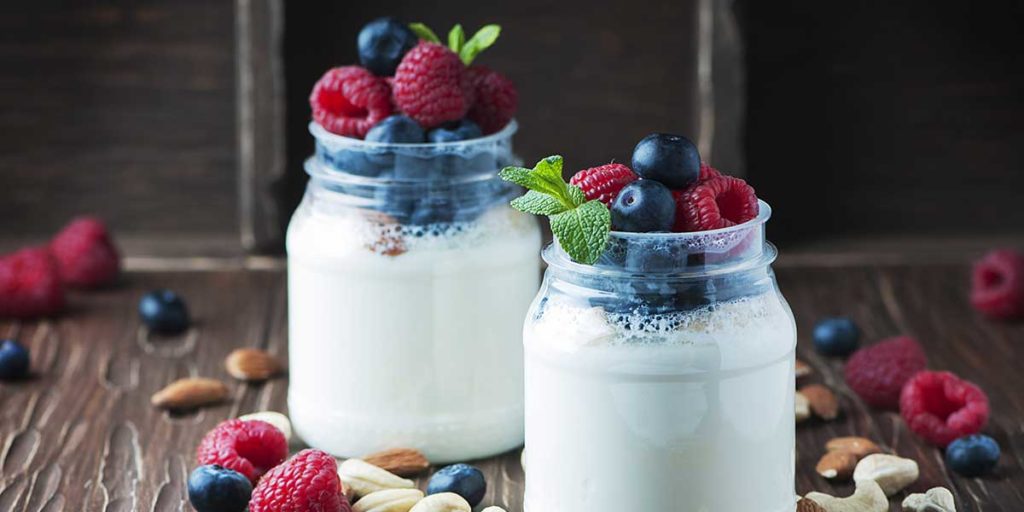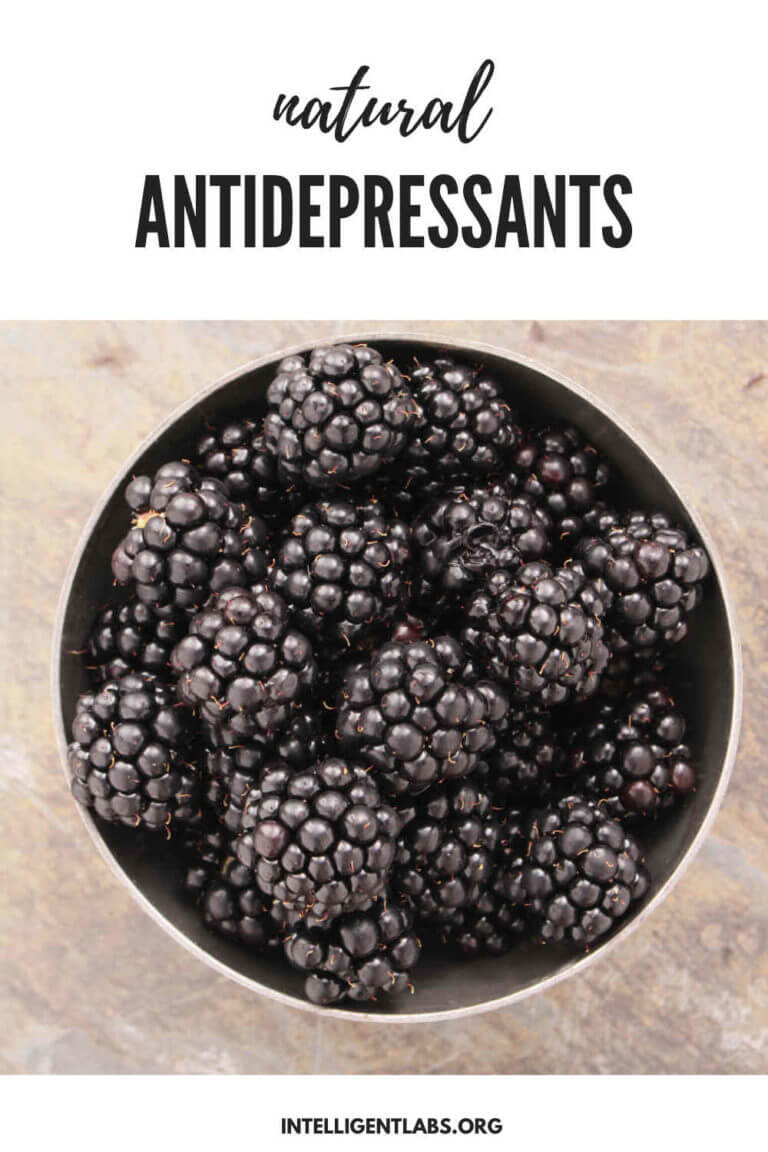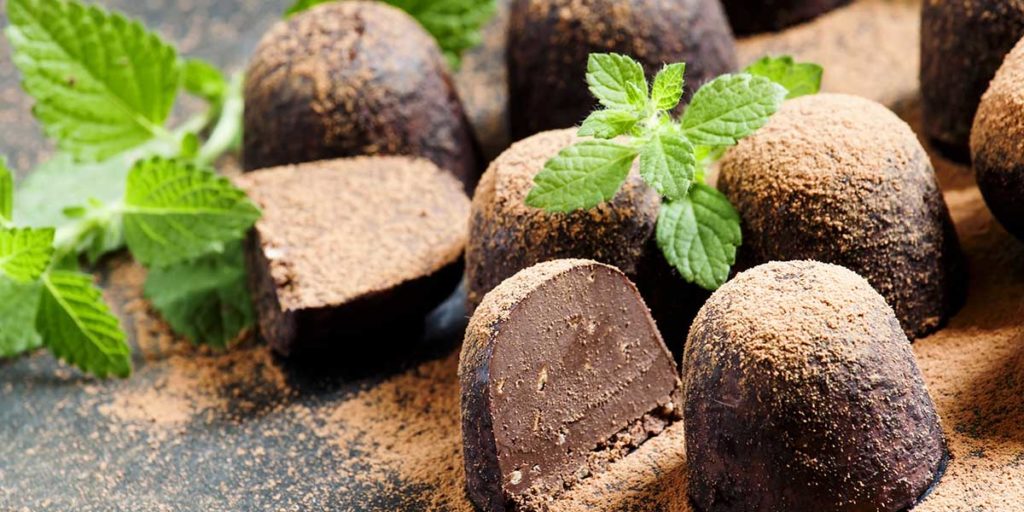Virginia Woolf said that “one cannot think well, love well, sleep well if one has not dined well.” Food has an incredible capacity to make us feel good. Food can make us happy. It’s not just about flavour and the feel-good factor. Food contains micronutrients that can impact the way our bodies and brains function. A survey by the Food and Mood project, led by the mental health charity Mind, concluded that around 90% of people found that changing their diet significantly improved their mental health. So, what foods do happy people tuck into?
Dark Chocolate
You know that advert where a woman melts into a puddle of bliss at the first crumbly bite of chocolate? Well, it turns out that it might not be so far-fetched after all. Chocolate, especially the dark, intense, high-cocoa stuff, contains the brain’s bliss molecule anandamide. A chemical messenger (neurotransmitter) produced in the brain, anandamide it works to temporarily block out “bad” feelings like pain and depression. In short, chocolate is happy food!
Anandamide actually acts similarly to marijuana – but researchers reassure us that with chocolate, we’re talking about something “much, much, much, much milder than a high”. The feel-good factor of chocolate is enhanced by two other magic ingredients that slow down the natural breakdown of anandamide, allowing it to build up in the brain. If you reach for chocolate when the going gets tough, consider it self-medication, not just self-indulgence! Enjoying just an ounce and a half of dark chocolate can make stress hormone levels plummet. That’s comfort eating at its best! (1,2,3)
 Yogurt
Yogurt
Live cultured or Greek yogurt is packed with probiotics, the “good” bacteria lining our guts that maintain healthy digestion and break down the fiber in our food. However, research has shown that the influence of probiotics can extend way beyond the bowels. In fact, an imbalance in gut bacteria has been linked to mental health conditions such as depression and anxiety.
This phenomenon could come down to serotonin, a neurotransmitter often referred to as the ‘happy molecule’ because of its vital role in maintaining mood. It’s a lesser-known fact that approximately 95% of the body’s serotonin is produced by our gut bacteria! Keep your serotonin levels topped off with yogurt containing active cultures, with a bonus punch of protein to keep your blood sugar levels, energy, and emotions stable. (4,5)
Oily Fish
Fish, especially oily varieties, are rich sources of omega-3 fatty acids. Mackerel, herring, salmon, sardines, tuna, and crab will all boost your omega-3 intake, so experiment with fresh, frozen, or canned versions.
Omega-3 fatty acids provide a wide range of health benefits, including lowering cholesterol levels and protecting against heart disease, diabetes, and cancer. Of course, it’s not just being healthier that’ll make you happy. Omega-3 fatty acids can also boost blood flow in your brain and keep dopamine levels high, which can, in turn, improve mood and cognitive function. In fact, a study in Brain Behavior and Immunity showed that students taking omega-3 supplements had a staggering 20 percent decrease in anxiety symptoms. Low omega-3 intake has been linked to symptoms of depression and may even be related to increased risk of suicide in elderly people. To prevent or combat depression, try increasing your fish intake or introduce an omega 3 supplement. (6,7)
Bananas
Bananas have a reputation as being depression-busting superfoods because they contain loads of L-tryptophan, a precursor to the “happy” chemical serotonin. L-tryptophan is an essential amino acid (meaning it cannot be produced by the body in adequate quantities and must be received from diet) that can be converted to serotonin in the brain. Unfortunately, only about 1 percent of dietary tryptophan is destined for the brain, so slicing that banana onto your granola every morning won’t necessarily work miracles. (8) However, every bit counts when it comes to neurotransmitters, so your daily banana may certainly help to perk you up!
Bananas are also packed with vitamin B6, which can help to ease anxiety and soothe stress. Ripe bananas, in particular, are rich in the amino acid tyrosine, which can be converted to dopamine, a neurotransmitter that helps us to experience pleasure and keep us driven and motivated. (9,10)
Curry
Fancy something spicier? India has one of the lowest rates of Alzheimer’s disease in the world, and it might be due to all the turmeric in Indian cooking!. Turmeric, the ingredient that gives curry powder its signature coloring, also plays a major role in brain health. Turmeric is packed with curcumin, a compound that can increase levels of Brain-Derived Neurotrophic Factor (BDNF), which can protect against both dementia and depression. So, having a regular vindaloo really could be the spice of life! (11)
Coffee
I’m a total grouch before I’ve had my morning Americano. The good news is, research confirms that this is not just bad behaviour on my part, it’s science! Coffee affects many of the chemical messengers that help control your mood. So, you’re not imagining things, that latte really can improve your sense of well-being.
Caffeine blocks adenosine receptors, which gives you an energy kick and stops that sleepy feeling. It also boosts dopamine and serotonin levels, helping you to feel happier, sharper, and more alert. Research has also shown that coffee triggers BDNF release, creating more neurons, allowing for a healthier brain and even reduced symptoms of depression.
 Blackberries
Blackberries
Blackberry season is about to start and the hedgerows are laden with berries, so get ‘brambling’ for a dose of nature’s free antidepressant! The purple pigments found in blackberries are what makes the difference. Anthocyanins, the substances that give blackberries and blueberries their characteristic colour, are antioxidants that mop up dangerous cancer-causing free radicals and also help your brain to make dopamine. Decreased dopamine levels can trigger depression, so gorge on berries for a lighter mood. (10) Healthy food is happy food!
References
1) Brain cannabinoids in chocolate E. di Tomaso, M. Beltramo, D. Piomelli, Nature, 382, 677-8 (1996)
2) Chocolate may mimic marijuana in brain. Chemical and Engineering News 74, 31 (1996).
3) Researchers say chocolate triggers feel-good chemicals (CNN, Linda Ciampa), CNN, Feb. 14, 1996.
4) That gut feeling. Dr. Siri Carpenter American Psychological Association. September 2012, Vol 43, No. 8
5) Gut emotions – mechanisms of action of probiotics as novel therapeutic targets for depression and anxiety disorders.( CNS Neurol Disord Drug Targets. 2014;13(10):1770-86) Slyepchenko A, Carvalho AF, Cha DS, Kasper S, McIntyre RS1.
6) Effect of fish-oil supplementation on mental well-being in older subjects: a randomized, double-blind, placebo-controlled trial (American Journal for Clinical Nutrition 2008) Ondine van de Rest, Johanna M Geleijnse, Frans J Kok, Wija A van Staveren, Willibrord H Hoefnagels, Aartjan TF Beekman, and Lisette CPGM de Groot
7) Omega-3 supplementation lowers inflammation and anxiety in medical students: a randomized controlled trial.(Brain Behav Immun. 2011 Nov;25(8):1725-34. doi:10.1016) Kiecolt-Glaser JK1, Belury MA, Andridge R, Malarkey WB, Glaser R.
8) Richard, D. M., Dawes, M. A., Mathias, C. W., Acheson, A., Hill-Kapturczak, N., & Dougherty, D. M. (2009). L-Tryptophan: Basic Metabolic Functions, Behavioral Research and Therapeutic Indications. International journal of tryptophan research : IJTR, 2, 45–60. https://doi.org/10.4137/ijtr.s2129
9) http://neuro.psychiatryonline.org/doi/pdf/10.1176/jnp.2010.22.4.451.e25
10) The role of dopamine in mood disorders. Diehl DJ, Gershon S. Compr Psychiatry. 1992 Mar-Apr;33(2):115- 20.
11) Critical Examination of Studies on Curcumin for Depression (J Clin Psychiatry 2014;75(10):e1110–e1112) Chittaranjan Andrade, MD






